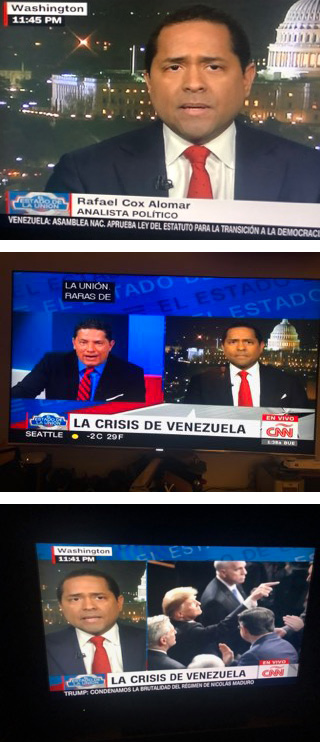

Home
.

2009, Ian Randle Publishers Revisiting the Transatlantic Triangle: The Constitutional Decolonization of the Eastern Caribbean
Su disertación doctoral originó lo que hoy se transforma en su primer libro. Rodeado de archivos, embriagado de entrevistas y cubierto de viajes en un crucial triángulo, el doctor Rafael Cox Alomar emprendió un estudio necesario.
Revisiting the Transatlantic Triangle: The Constitutional Decolonization of the Eastern Caribbean es el libro que este historiador y abogado puertorriqueño gestó luego de cinco años de investigación. De acuerdo con Cox, el enfoque de este trabajo fue estudiar cómo los ingleses descolonizaron el Caribe y recopilar el clima de las negociaciones entre los políticos, en el marco de la Guerra Fría entre 1962 y 1967.
El esfuerzo de descolonización de las posesiones británicas en el Caribe (Antigua-Barbuda, San Cristóbal-Nevis-Anguilla, Monserrate, Dominica, Santa Lucía, San Vicente, Granada y Barbados), es un relato que guarda un margen de relación con la situación política de Puerto Rico.
“Este libro se llama Revisitando el triángulo transatlántico porque tienes a Londres bregando con el Caribe, pero está Washington que tiene una colonia en el Caribe que se llama Puerto Rico”, expone quien posee un doctorado en historia de la Universidad de Oxford en Inglaterra.
Tras compartir con líderes caribeños que vivieron el drama, Cox dice que los puertorriqueños deben “entender que los procesos de descolonización tienen que ajustarse a la realidad política, demográfica, sociológica, económica, de la jurisdicción en cuestión”.
Según el egresado de la Escuela de Derecho de la Universidad de Harvard, pese a que redactó el libro a millas de Puerto Rico, su auditorio fueron sus compatriotas. “Lo que yo perseguía al escribir el libro era que […] en Puerto Rico nos situáramos en tiempo y espacio: ‘Somos puertoriqueños y somos caribeños’”, comenta Cox.
Cox Alomar has acted as counsel on various international arbitrations before the World Bank’s International Centre for the Settlement of Investment Disputes (ICSID) representing, among others:
He advises with regularity on international commercial arbitration matters; in particular on issues related to questions of arbitrability, composition of the arbitral tribunal and litigation proceedings to compel to arbitration as well as to recognize and enforce arbitral awards.
Cox Alomar has also acted on behalf of several multilateral lending institutions such as:
Of particular relevance is his co-representation in 2009 of the IDB in its first ever Yen-denominated loan — which consisted of nineteen billion six hundred million Yen (¥ 19,600,000,000) to finance the capital expenditures of a Brazilian steel conglomerate. This deal closed on March 27, 2009 and received raving reviews in the Latin Lawyer Magazine (Vol. 8, Issue 4).
He has acted as arbitrator in various FINRA (Financial Industry Regulatory Authority) arbitrations.
The lawyer was also co-counsel in the successful representation of the Commonwealth of Puerto Rico in Puerto Rico Federal Affairs Administration in Rodríguez v. PRFAA, 435 F. 3d 378 (D.C. Cir. 2006).
As an expert on the Cuban legal landscape, he also advises parties on the regulatory and legal nuances arising under the 2014 Cuban Foreign Investment Act, as well as under Cuba’s numerous bilateral investment treaties.
In recent years, Cox Alomar has also acted on behalf of public entities on regulatory matters before:
He is also active advising parties on the plethora of legal and regulatory issues arising under the 2016 Puerto Rico Oversight Management and Economic Stability Act (“PROMESA”).
Commonwealth of Puerto Rico
District of Columbia
State of New York
U.S. Supreme Court
Luis Muñoz Marín Foundation (Former Board Member)
Hispanic National Bar Association
American Bar Association
American Society of International Law
Washington Foreign Law Society
Harvard Law School Association
Oxford University Society of Washington, D.C.
Association of Marshall Scholars
Rafael Cox Alomar consults at the crossroads of international dispute resolution, energy, finance transactions, and federal regulatory matters. Admitted in Washington D.C., New York, and Puerto Rico, Rafael has practiced law since 2004 in some of the most prestigious international law firms in Washington, D.C., acting on behalf of clients on a wide array of dispute resolution and transactional matters.
He also has a professorial appointment at the University of the District of Columbia’s David A. Clarke School of Law in Washington D.C., where since 2014 he teaches Constitutional Law 1 and 2, Remedies, Private International Law, Public International Law, and International Business Law.
He is an Adjunct Professor at the Georgetown Law Center (Georgetown University), where he teaches a JD course entitled Practicing Law in a Foreign Country.
As a law professor, his scholarly interests range widely, from the constitutional aspects of decolonization in the peripheral jurisdictions of the British, French, and Dutch Empires in the postwar period, to the juridical penumbras of bilateral investment treaty interpretation within the framework of investor-state international arbitration.


